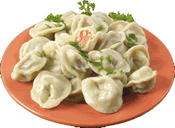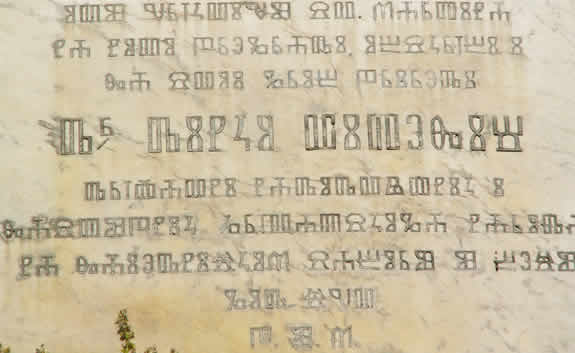Here’s another recording in a mystery language.
I was just sent this clip and asked if I recognise the language. I don’t. Do you?
It sounds like a tongue twister in a Romance language to me, though I don’t know which one.
Here’s another recording in a mystery language.
I was just sent this clip and asked if I recognise the language. I don’t. Do you?
It sounds like a tongue twister in a Romance language to me, though I don’t know which one.
Here’s a recording in a mystery language.
Can you identify the language, and do you know where it’s spoken?
Here is a mysterious inscription on a musket that was posted on the Omniglot fan club recently:

See a larger version of this image.
The person who sent this in the asked me to post the image here with this analysis from Christopher Ray Miller:
I think this is more likely in the Kaithi script, which is closely related to modern Gujarati script, both being descended from informal styles of writing Nāgarī (before it gained the “Deva-” prefix). Although in most 19th and 20th century examples of Kaithi, the ‹l› letter looks more or less like a cursive Greek Theta, there are a few examples of it with the same ‘C-I’ shape as Gujarati that we see herein the second and fourth positions from the end.
What makes me think this is probably Kaithi is the ‹v› just below the right end of the metallic attachment on the top of the gun. It is the same basic shape as ‹w› in Gujarati and Devanagari, but has a small circle below it, which corresponds to the dot/nuqta diacritic for ‹v› in Kaithi, the only thing distinguishing it from ‹b›. (The two letters merged because in most languages of northeastern India, the older distinct /v/ and /b/ phonemes merged into /b/, just like in Spanish, for example.
The letter just above the second ‘0’ and above and to the left of the ‘9’ shape (probably the numeral ‘1’) seems to be an early version of ‹j›, more similar to the old Nāgarī shape than the 19th-20th century Kaithi shape, which is like a ‘S’ rotated 90º. The letter just to the right of the putative ‹j› looks very much to be the Kaithi ‹a› letter.
I imagine this is in one of the languages of northeastern India that commonly used Kaithi script, e.g. Bhojpuri, Maithili, Awadhi and others.
Can anybody translate the inscription and/or add anything to this?
I learnt the Welsh expression Paid a gwgu! [paɪd a ˈgʊgɨ] from friends in Aberystwyth yesterday. It means ‘Don’t frown/glower/scowl!’. I like the sound of gwgu, which doesn’t seem like a frowny word to me – it’s more like a baby’s babbling. Related words include gwg (frown) and gwgus (frowning).
Words for frown in Irish, grainc and gruig, are possibly related to the Welsh word gwg. Other words frowny Irish words include púic and místá. The verbal expression is grain/gruig a chur ort féin (to put a frown on oneself), and an idiomatic way of saying, for example, ‘he frowned at me’ is bhí muc ar gach mala aige chugam (“he had a pig on each eyebrow to me”).

Characters in the novels by Andrey Kurkov (Андрій Юрійович Курков) that I’ve read recently often enjoy a bowl of dish of pelmeni, which is obviously some kind of food, but is not translated. I wondered what pelmeni might be, so thought I’d find out.
According to Wikipedia, pelmeni are “dumplings consisting of a filling wrapped in thin, unleavened dough that originated in Siberia”. The dough is made of flour and water, with eggs sometimes added, and the filling is minced pork, lamb, beef, mutton or other meat, mixed with pepper or other spices and onions, or with fish or mushrooms. They are cooked by boiling them in water or broth, or by frying.
In Russian they are known as пельмени (pel’meni – pl) / пельмень (pel’men’ – sg), in Belarusian they are пяльмені (pyal’meni), in Ukrainian they are пельмені, (pel’meni), and in Latvian they are pelmeņi. The name comes from пельнянь (pel’nyan’), which means “ear bread” in the Komi, Udmurt, and Mansi languages.
According to the School of Russian and Asian Studies Russian pelmeni (русские пельмени) come from Siberia and the word comes from Komi, though the receipe might originally come from China. They certainly sound like to Chinese 餃子 (饺子) jiǎozi.
Here are some pelmeni recipes:
http://tasterussian.com/russian-pelmeni-recipe.html
http://www.russianfoods.com/en/pelmeni/
http://www.ruscuisine.com/recipes/breads-and-pastry/dumplings/n–524
Are you a fan of pelmeni, or do you have something similar in your country?
Here’s a recording of a song in a mystery language
Can you identify the language, and do you know where it’s spoken?
Gordon Bennett! is used as an exclamation of surprise or disbelief. According to The Phrase Finder, it first appeared in print as an exclamation in a 1937 novel by James Curtis – You’re in the Racket Too, and is possibly a version of the exclamation Gor blimey!, a euphemistic version of God blind me!.
It is also believed that the exclamation is related to one James Gordon Bennett Jr. (1841-1918), a journalist whose father, also James Gordon Bennett, founded the New York Herald. JGB Jr. was apparently notorious for his wild lifestyle and extravagant spending and newsworthy stunts.
Is Gordon Bennett! used in other English-speaking countries?
Are toned-down versions of oaths, like Gordon Bennett!, used in other languages?
Here’s a photo on an inscription sent in by a visitor to Omniglot. It comes Vrbnik, a village on Krk, an island off Croatia.

See a larger version of the image.
The alphabet is Glagolitic. Does anyone know what the language is and what it says?
The other day I found an interesting article in the New York Times about monolingualism and multilingualism in the USA and elsewhere. There’s a widespread belief that most Americans are monolingual in English, and that elsewhere it’s common for people to know two or more languages. The article asks whether this belief is true.
The question about language in the US census focuses on language use at home and doesn’t ask about use of languages other than English elsewhere, and the writer points out that many Americans who speak foreign languages speak only English at home, so for the purposes of the census they are monoglot English speakers. According to the 2009 census, for example, 20% of Americans speak a language other than English at home. The aim of the census is not to discover people’s foreign language skills, but to “track immigrants’ integration into mainstream American society and to ascertain what services they need, and in what languages”, so this is understandable.
The writer suggests that a better question would be “Can you have a conversation in a language besides your mother tongue?”, which was asked in a survey by the European Commission in 2006 – 56% of those who completed that survey answered yes. So perhaps the assumption that bilingualism and multilingualism are normal and unremarkable in much or the world is not entirely true. There are no reliable figures on this anyway, so it’s impossible to be sure. The conclusion is that Americans may be no more or less multilingual than people in other countries.
According to a correspondent who contacted me today, one of the US presidential candidates, Newt Gingrich, has attacked one of the other candidates, Mitt Romney, for speaking French. Not only does he speak French, but there’s also a video of him on YouTube speaking in French (made 10 years ago). What is the world coming to!
Here’s Newt Gingrich’s video in which he critcizes Mitt Romney for, among other things, speaking French:
The correspondent asks “Do your politicians get THIS crazy on the other side of the pond? Just curious…”
I haven’t noticed this kind of nonsense here in the UK – what about in other countries?